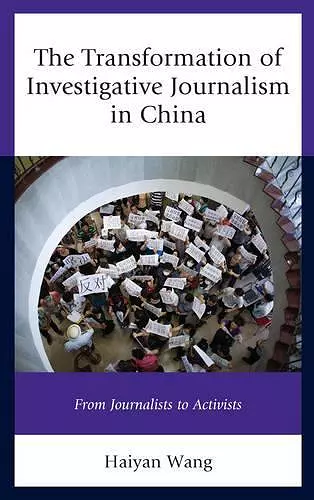The Transformation of Investigative Journalism in China
From Journalists to Activists
Format:Hardback
Publisher:Lexington Books
Published:29th Apr '16
Currently unavailable, and unfortunately no date known when it will be back

This insightful book explores the evolution of journalism in China, focusing on how investigative journalism has shifted to a more activist role, particularly in the 2010s.
The book The Transformation of Investigative Journalism in China delves into the evolution of journalism in China, particularly focusing on the shift from traditional practices to a more activist-oriented approach. Beginning in the 1980s, following Deng Xiaoping's media reforms, investigative journalism began to flourish, allowing journalists to explore topics previously deemed off-limits during the Communist era. As the years progressed, the landscape of journalism transformed, with an increasing number of reports being published across various media platforms, showcasing a broader range of issues and concerns.
However, the 2010s marked a significant change, as investigative journalism began to give way to activist journalism. This book examines how journalists in this new era leverage emerging media technologies and respond to societal demands for accountability and transparency. These journalists no longer view themselves merely as reporters; they embrace roles as social activists, challenging state authority and advocating for democratic reforms. Their work extends beyond the confines of traditional newsrooms, as they actively engage in organizing social movements and addressing pressing societal issues.
The Transformation of Investigative Journalism in China provides a comprehensive analysis of this significant shift, highlighting the ways in which journalism has evolved from being a mere instrument of the state to a vital force for social change. Through this exploration, the book sheds light on the potential for journalism to foster democratic engagement and accountability in contemporary China.
Wang (Shenzhen Univ.) describes how elite Chinese journalists recently created a professional paradigm that blends social activism with investigative reporting. Wang suggests the formation of an investigative and advocacy journalistic model is a unique adaptation to contemporary governmental controls, social norms, and journalistic practices in China. Wang explains that leading Chinese journalists are increasingly focused on fostering democratic reforms in China and sometimes help organize social reform movements.... [T]he text is well researched with helpful chapter footnotes, a bibliography, and an index. The book’s thesis contrasts with the portrayal of Chinese journalism in some recent books, such as Doug Young's The Party Line: How the Media Dictates Public Opinion in Modern China (Wiley, 2013). Recommended for collections in international journalism as well as contemporary Chinese culture. Summing Up: Recommended. Upper-division undergraduates through professionals. * CHOICE *
Well-researched and documented, Haiyan Wang’s book successfully maps out the process by which investigative journalism in China has taken an advocacy turn to become an activist form of journalism during the reform era. It shows how the journalistic professionalism of the West is appropriated for the articulation of an emergent journalistic paradigm that is rooted in Chinese intellectual traditions and contextual dynamics. The book will become a key text for anyone interested in the mutual constitution between journalism and social change in contemporary China. -- Joseph M. Chan, The Chinese University of Hong Kong
Haiyan Wang has written a smart, eye-opening book about investigative journalism and activism. Wang deftly shows how and why investigative reporting often blends into activist reporting in contemporary China, given persistent limitations grounded in the country´s media politics and economics. The analysis is grounded in impeccable research and offers novel insights into how journalists negotiate personal and institutional commitments amid challenging conditions. This book is a must-read for understanding why investigation and activism are not divergent journalistic traditions. -- Silvio Waisbord, George Washington University
Lucidly written and richly contextualized, Dr. Wang's compelling analysis of investigative journalism and activism clarifies the ambiguities and contradictions of ‘media reform’ in China. It also holds considerable implication for comparative communication. -- Chin-Chuan Lee, City University of Hong Kong
ISBN: 9781498527613
Dimensions: 235mm x 162mm x 20mm
Weight: 435g
188 pages